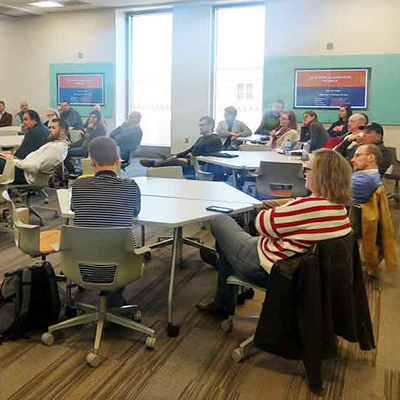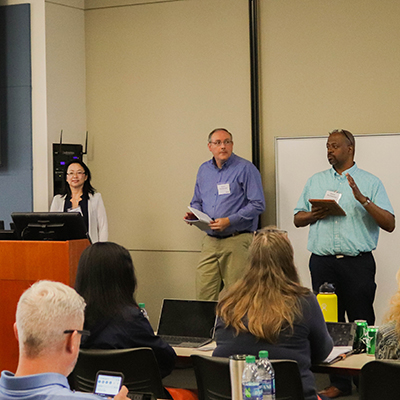Much of the technology on Auburn University's campus operates due to behind-the-scenes work. A great deal of time and effort goes into making sure business and administrative operations run as smoothly as possible. Several groups fall into this category, including the executive leadership, the administration team, all of the enterprise application teams, the web support team, and the identity and access management team. They provide a wide variety of services, but together they help keep Auburn University running the way that it should.

After gathering information and input throughout 2018 and 2019, the Office of Information Technology published their first Strategic Plan at the end of 2019.This plan, which spans from 2020-2024, provides contextual data for Auburn University's specific needs and the unique requirements of higher education institutions. It then outlines 5 primary goals, all of which are designed to align with Auburn University's Strategic Plan. The primary goals are:
Work on these goals began immediately in 2019 and will continue to grow over years to come as we work toward OIT's mission to provide technology services and tools that stakeholders need to accomplish Auburn University's mission and vision.
Click here to read the 2020-2024 Information Technology Strategic Plan for Auburn University.
Throughout 2019, the Office of Information Technology revised four University IT Policies and created three new ones. Auburn University employees and students are responible for understand and abiding by official policies. The updated policies are:
The three new policies are as follows:
Click here to read a summary of all the IT policy changes from 2019, or click on the individual links above to read the fully policy.

Several OIT teams are dedicated specifically to managing the campus enterprise system, Banner, and all the data management that surrounds it. In addition to regular maintenance and updates, all of the teams devoted good portions of 2019 to certain trainings and upgrades.
All administrative services were upgraded to the newest version, including all custom forms needed for Auburn Business functions. Similarly, the system that runs AUAccess was upgraded to make more mobile friendly and easier to support.
In addition to administrative services, several other campus systems underwent major changes. Throughout the year, these teams assisted with enhancements to the Tiger Dining Meal Plan Selection application, the implementation of a new system for Housing, and the development of a web application that allows students manage change of major requests online.
With all of the data that is required to make these and other systems run, OIT employs analytical software to help collect and use that information effectively. This year, OIT sent representatives to an annual training conference hosted by that software company and then hosted training here to help others on campus make the most of it. The Enterprise Systems team also started the design for an overarching Data Warehouse which will create a secure, uniform location for campus information to reside so that employees can access it as needed. This project will continue to grow throughout 2020.

Providing direct support to end users is a major element of any IT organization. In addition to the IT Service Desk mentioned on the Student Education page, OIT also offers endpoint support and web support.
The endpoint support team employs full-time and student staff to go throughout campus and assist end users with university-provided computers, printers, etc. This group previously ran on a lease-based model, but 2019 saw them move to a purchase-based model in order to have access to more support. This group also took over the maintenance for all the newly-installed classroom computers in the Haley Center.
The web support team deployed a new system in 2018 to provide self-service knowledge as well as a ticketing system, both of which can be used by IT providers across campus. In 2019, this group implemented 179 updates, which contained 7,409 distinct configuration changes, as well as a full system update to a newer version in order to continue providing better service across campus. Some team members also attended training conferences, and subsequently created a user group on campus to help other users feel more comfortable with the system. This team also supports all the campus SharePoint sites, which were all upgraded to the newest version in 2019.
| 27 sub-goals spread across 5 primary goals in the OIT Strategic Plan |
| 7 Information Technology policies created or updated in 2019 |
| 7,409 configuration changes implemented to improve our ticketing system |
| 608 web support incident or service request tickets resolved or fulfilled |
| 900+ access managment incident or service request tickets resolved or fulfilled |
| 1,000+ people, from 61 units on campus, with devices managed by our endpoint support team |
Last Updated: November 17, 2023